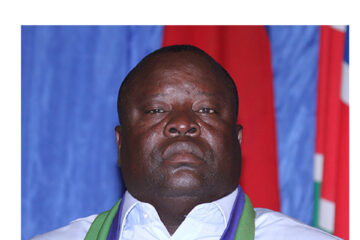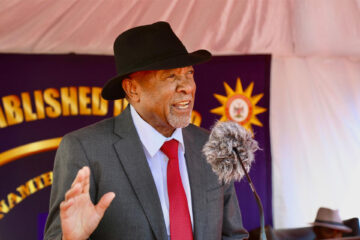Martin Endjala
It is no secret that geopolitics is becoming a factor in investment attraction and international trade and Namibia is said to be sailing in such turbulent waters.
Hence the need to adopt a collective approach to navigate stormy waters.
These were the words of the Namibia Chamber of Commerce and Industry President, Bisey Uirab during the first-of-its-kind State of Business Address in Namibia held in Windhoek on Monday, which will become an annual occurrence.
Uirab said that there is a trend emerging from some quarters globally, among which there are developed countries that favour, and some would say even actively promote protectionism and regionalism, adding that for smaller open economies like Namibia, this is a worrying development.
“So, it is not surprising that countries, regions and economic groupings and trade blocks are closing ranks to stimulate production and thereby offer a degree of protectionism to enterprises. This is being done in various ways that, among others, include policy changes, fiscal assistance, and the concluding of bilateral to multilateral agreements,” explained Uirab.
He argued that despite Namibia having achieved a measure of success on its economic repositioning and diversification journey, much work remains.
“Value addition is no longer just a talking point,” he said.
The country has demonstrated that it is open to investment, especially in innovative and novel sectors such as renewable energy on the upper end, and cosmetic production at the grassroots level, never losing sight of the importance of broadening our industrial base and expanding the country’s economy.
However, Uirab stressed that Namibia will fail in its endeavour to grow its economy unless skills development and technological innovation are addressed. In parallel, the country requires business-friendly policy measures that will support the integration of new sectors.
“Let us not mislead ourselves, the only way forward when it comes to growing Namibia’s economy at three or four times the percentage achieved over the past three decades is through collaboration. By government and the private sector working closer together. And this will be underscored through strengthening our relationship with other economies in Sub-Saharan Africa and more broadly on the continent of Africa,” Uirab said.
He maintained that the enterprise sector has a collective responsibility to proffer recommendations and suggestions on how business, government, labour and civil society, by working together, can position the country to do better.
SoBA aims to draw all sectors of the business sector closer in the quest to accelerate the transformation and repositioning of the Namibian economy through value addition, innovation and investment, as mandated by the HPPII.
Its common goal is to grow and transform the Namibian economy to be inclusive, and sustainable, and address inequality and unemployment.
Uirab said that there is no place for fragmentation amongst participants in the economy. Neither is there any room for ineffective or garbled communication within the economy.
Following an assessment by NCCI, and based on the responses received from sectorial representative bodies and entrepreneurs, it has been identified that there is a need for improved communication between the private sector and policymakers.
There is a need for the formalisation of communication channels between the public and the private sectors, best practices and experience sharing, and to strategize on how best to deal with challenges and opportunities that would lead to improved competitiveness of Namibia’s economy.
The absence of a forum to track the implementation of policies, processes and interventions merely retards economic growth.
Moreover, NCCI wants the SoBA to be viewed as a platform for businesses to deliberate and agree on key matters requiring reform and redress and also engage with policymakers, policy implementors and regulatory authorities.
NCCI is recommending that there must be less talk and more action on the role of the private sector in making full use of one of the nation’s largest post-Independence investments, the Neckartal Dam in the south.
Integration of renewable energy in agricultural processes, capitalize state entities like the Development Bank of Namibia (DBN) adequately to deliver timeously and fully on mandates.
Uirab emphasised that economic growth is directly linked to transformation, and this requires the creation of opportunities for all Namibians to live productive, prosperous, and dignified lives, factors that hinder economic prosperity must be laid bare and this means decisively tackling these issues and concerns.




